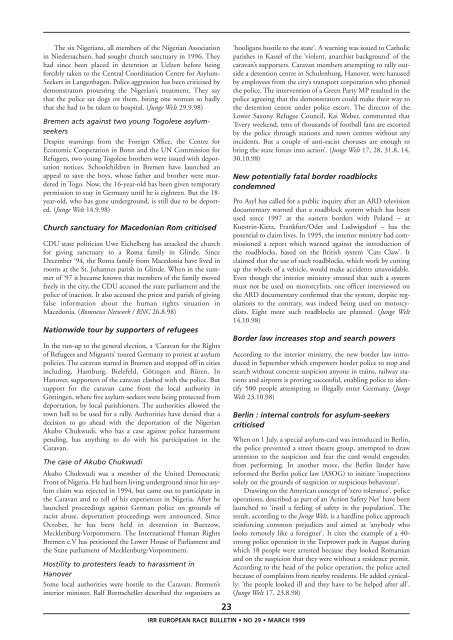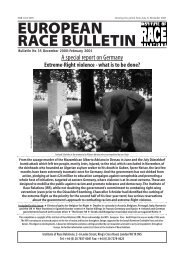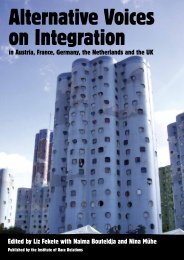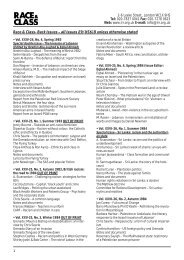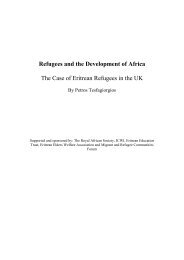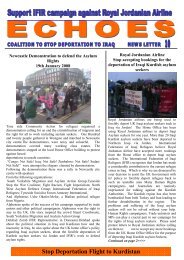EUROPEAN RACE BULLETIN - Institute of Race Relations
EUROPEAN RACE BULLETIN - Institute of Race Relations
EUROPEAN RACE BULLETIN - Institute of Race Relations
Create successful ePaper yourself
Turn your PDF publications into a flip-book with our unique Google optimized e-Paper software.
The six Nigerians, all members <strong>of</strong> the Nigerian Associationin Niedersachsen, had sought church sanctuary in 1996. Theyhad since been placed in detention at Uelzen before beingforcibly taken to the Central Coordination Centre for Asylum-Seekers in Langenhagen. Police aggression has been criticised bydemonstrators protesting the Nigerian’s treatment. They saythat the police set dogs on them, biting one woman so badlythat she had to be taken to hospital. (Junge Welt 29.9.98)Bremen acts against two young Togolese asylumseekersDespite warnings from the Foreign Office, the Centre forEconomic Cooperation in Bonn and the UN Commission forRefugees, two young Togolese brothers were issued with deportationnotices. Schoolchildren in Bremen have launched anappeal to save the boys, whose father and brother were murderedin Togo. Now, the 16-year-old has been given temporarypermission to stay in Germany until he is eighteen. But the 18-year-old, who has gone underground, is still due to be deported.(Junge Welt 14.9.98)Church sanctuary for Macedonian Rom criticisedCDU state politician Uwe Eichelberg has attacked the churchfor giving sanctuary to a Roma family in Glinde. SinceDecember ‘94, the Roma family from Macedonia have lived inrooms at the St. Johannes parish in Glinde. When in the summer<strong>of</strong> ‘97 it became known that members <strong>of</strong> the family movedfreely in the city, the CDU accused the state parliament and thepolice <strong>of</strong> inaction. It also accused the priest and parish <strong>of</strong> givingfalse information about the human rights situation inMacedonia. (Romnews Network / RNC 26.8.98)Nationwide tour by supporters <strong>of</strong> refugeesIn the run-up to the general election, a ‘Caravan for the Rights<strong>of</strong> Refugees and Migrants’ toured Germany to protest at asylumpolicies. The caravan started in Bremen and stopped <strong>of</strong>f in citiesincluding, Hamburg, Bielefeld, Götingen and Büren. InHanover, supporters <strong>of</strong> the caravan clashed with the police. Butsupport for the caravan came from the local authority inGöttingen, where five asylum-seekers were being protected fromdeportation, by local parishioners. The authorities allowed thetown hall to be used for a rally. Authorities have denied that adecision to go ahead with the deportation <strong>of</strong> the NigerianAkubo Chukwudi, who has a case against police harassmentpending, has anything to do with his participation in theCaravan.The case <strong>of</strong> Akubo ChukwudiAkubo Chukwudi was a member <strong>of</strong> the United DemocraticFront <strong>of</strong> Nigeria. He had been living underground since his asylumclaim was rejected in 1994, but came out to participate inthe Caravan and to tell <strong>of</strong> his experiences in Nigeria. After helaunched proceedings against German police on grounds <strong>of</strong>racist abuse, deportation proceedings were announced. SinceOctober, he has been held in detention in Buetzow,Mecklenburg-Vorpommern. The International Human RightsBremen e.V has petitioned the Lower House <strong>of</strong> Parliament andthe State parliament <strong>of</strong> Mecklenburg-Vorpommern.Hostility to protesters leads to harassment inHanoverSome local authorities were hostile to the Caravan. Bremen’sinterior minister, Ralf Borttscheller described the organisers as23IRR <strong>EUROPEAN</strong> <strong>RACE</strong> <strong>BULLETIN</strong> • NO 29 • MARCH 1999‘hooligans hostile to the state’. A warning was issued to Catholicparishes in Kassel <strong>of</strong> the ‘violent, anarchist background’ <strong>of</strong> thecaravan’s supporters. Caravan members attempting to rally outsidea detention centre in Schulenburg, Hanover, were harassedby employees from the city’s transport corporation who phonedthe police. The intervention <strong>of</strong> a Green Party MP resulted in thepolice agreeing that the demonstrators could make their way tothe detention centre under police escort. The director <strong>of</strong> theLower Saxony Refugee Council, Kai Weber, commented that‘Every weekend, tens <strong>of</strong> thousands <strong>of</strong> football fans are escortedby the police through stations and town centres without anyincidents. But a couple <strong>of</strong> anti-racist choruses are enough tobring the state forces into action’. (Junge Welt 17, 28, 31.8, 14,30.10.98)New potentially fatal border roadblockscondemnedPro Asyl has called for a public inquiry after an ARD televisiondocumentary warned that a roadblock system which has beenused since 1997 at the eastern borders with Poland – atKuestrin-Kietz, Frankfurt/Oder and Ludwigsdorf – has thepotential to claim lives. In 1995, the interior ministry had commissioneda report which warned against the introduction <strong>of</strong>the roadblocks, based on the British system ‘Cats Claw’. Itclaimed that the use <strong>of</strong> such roadblocks, which work by cuttingup the wheels <strong>of</strong> a vehicle, would make accidents unavoidable.Even though the interior ministry stressed that such a systemmust not be used on motorcylists, one <strong>of</strong>ficer interviewed onthe ARD documentary confirmed that the system, despite regulationsto the contrary, was indeed being used on motorcyclists.Eight more such roadblocks are planned. (Junge Welt14.10.98)Border law increases stop and search powersAccording to the interior ministry, the new border law introducedin September which empowers border police to stop andsearch without concrete suspicion anyone in trains, railway stationsand airports is proving successful, enabling police to identify500 people attempting to illegally enter Germany. (JungeWelt 23.10.98)Berlin : internal controls for asylum-seekerscriticisedWhen on 1 July, a special asylum-card was introduced in Berlin,the police prevented a street theatre group, attempted to drawattention to the suspicion and fear the card would engender,from performing. In another move, the Berlin länder havereformed the Berlin police law (ASOG) to initiate ‘inspectionssolely on the grounds <strong>of</strong> suspicion or suspicious behaviour’.Drawing on the American concept <strong>of</strong> ‘zero tolerance’, policeoperations, described as part <strong>of</strong> an ‘Action Safety Net’ have beenlaunched to ‘instil a feeling <strong>of</strong> safety in the population’. Theresult, according to the Junge Welt, is a hardline police approachreinforcing common prejudices and aimed at ‘anybody wholooks remotely like a foreigner’. It cites the example <strong>of</strong> a 40-strong police operation in the Treptower park in August duringwhich 18 people were arrested because they looked Romanianand on the suspicion that they were without a residence permit.According to the head <strong>of</strong> the police operation, the police actedbecause <strong>of</strong> complaints from nearby residents. He added cynically:‘the people looked ill and they have to be helped after all’.(Junge Welt 17, 23.8.98)


